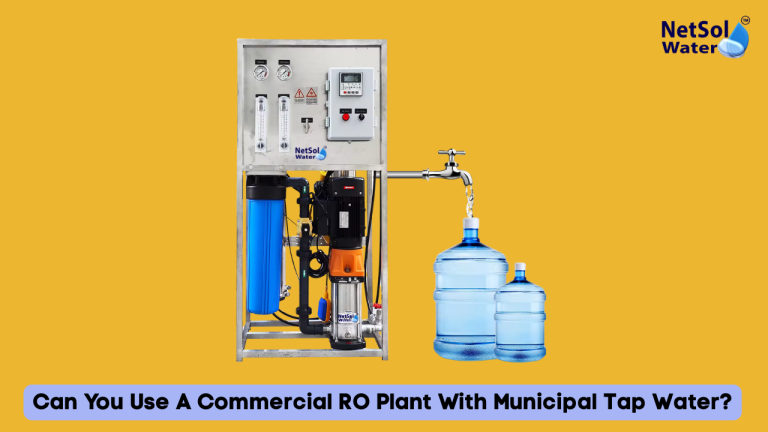
When considering institutions or companies installing a water purifier, one of the questions asked most frequently is whether it is possible to utilize a commercial RO plant using tap municipal water. Yes, it is possible, but there are important considerations to keep in mind so that the system will be effective and provide safe, good-quality water.
In this blog, we will be discussing the points of consideration and benefits of utilizing a RO plant with municipal tap water how municipal water affects RO Plants, and pre-treatment needs to provide system performance.
Learning about Municipal Tap Water Quality
Municipalities tend to treat tap water based on municipal drinking safety levels of the region. It is normally disinfected, purified and chemicals applied in eliminating disease-causing and non-harmful contaminating bacteria. However, the municipal water can be dissolved in taste, chlorine, organic and other impurities which may influence the taste, smell and health.
As the municipal tap water is to be used in the operation of the commercial RO plant, the inlet can be varied with the source of water quality, the treatment, and the local distribution system. All RO plant may be influenced by some areas having hard water, excessive chlorine or intermittent turbidity.
Why Use a Commercial RO Plant with Municipal Tap Water?
Even though municipal water is treated, many businesses and industries require higher levels of purity water to accommodate their processes. A commercial RO plant provides:
- Removal of dissolved salts and minerals to improve the quality and taste of water.
- Elimination of chloramines and chlorine that are damaging to RO membranes.
- Reduction of Total Dissolved Solids (TDS) to safe concentrations.
- Consistent quality of water for industrial, commercial, or hospitality purposes.
- Shielding sensitive equipment that use water.
Hence, a Commercial RO plant with municipal tap water is a secondary treatment process producing water of stringent quality requirement beyond municipal treatment capacity.
Pre-Treatment Requirements of Municipal Tap Water
Pre-treatment of municipal tap water is required prior to going to RO membranes due to:
- Chlorine in municipal tap water has the potential to destroy RO membranes quickly.
- Suspended solids and sediment tend to foul membranes.
- Hardness and scaling salts need to be reduced in order to prevent scaling.
- Organic material and bacteria should be kept to a minimum.
Pre-treatment processes include activated carbon filtration (purging chlorine), filtration through sediments, and water softening in some cases. Such pre-filters protect the RO unit and increase its life time.
Problematic Issues Using Tap Water from Cities in RO Plants
While Commercial RO plant with municipal tap water is common, there are a few issues one may anticipate:
1) Chlorine Damage: Chlorine in municipal water causes damage to RO membranes if not removed.
2) Variable Water Quality: Variations in municipal water quality with the season or when maintenance work is undertaken can affect the performance of RO plants.
3) Scaling and Fouling: Calcium and magnesium minerals cause scaling, reducing membrane life.
4) Microbial Growth: Bacteria and organics may grow and foul the membranes if pre-treatment is inadequate.
Proper design, monitoring, and maintenance are necessary to counter these problems.
Benefits of Using Commercial RO Plants with Municipal Tap Water
Despite challenges, many benefits:
1) Regular Water Quality: RO plants assure regular elimination of contaminants despite the fluctuation in municipal water quality.
2) Better Taste and Safety: RO purifies and eliminates dissolved solids and hazardous chemicals rendering water as safer and tastier.
3) Effective Cost: supplying of municipal water is cheaper compared to supplying it at the ground or any other source.
4) Compliance: It makes the water to be in compliance with the regulatory standards of water that are mandatory as far as the industrial and commercial usage of water is concerned.
How to Optimize Commercial RO Plant Performance with Municipal Tap Water
For better performance by the use of Commercial RO plant with municipal tap water, do the following:
1) Perform detailed water analysis to be aware of the municipal water profile.
2) Install appropriate pre-filters (sediment, activated carbon, softeners) based on the test reports.
3) Periodically test the quality of water to detect any changes in advance.
4) Regularly clean and maintain the RO membranes.
Utilize automatic monitoring systems to initiate alarms when water parameters become dangerous.
Conclusion
Operating a Commercial RO plant with municipal tap water is a cost-effective and wise solution for the majority of companies and industries. As the municipal water undergoes treatment, an RO plant offers an essential purification layer to ensure water quality is always high and safe.
Proper pre-treatment and maintenance guarantee overcoming challenges such as chlorine degradation and scaling. A well-designed system and proper maintenance would render municipal tap water pure, high-quality water suitable for different applications in a commercial RO plant.
If you are to install or replace a municipal water supply commercial RO plant, ensure that you consult experts to examine water quality and select proper pre-treatment systems. This will allow for the optimization of efficiency, minimization of costs, and safe, quality water for your enterprise.
Do you need an advice or assistance on selecting the best water and waste water treatment unit? We have solutions for all your problems!
Let us know your problem, our experts will make sure that it goes away.
For an assistance or related query,
Call on +91-9650608473
Or write us at enquiry@netsolwater.com
